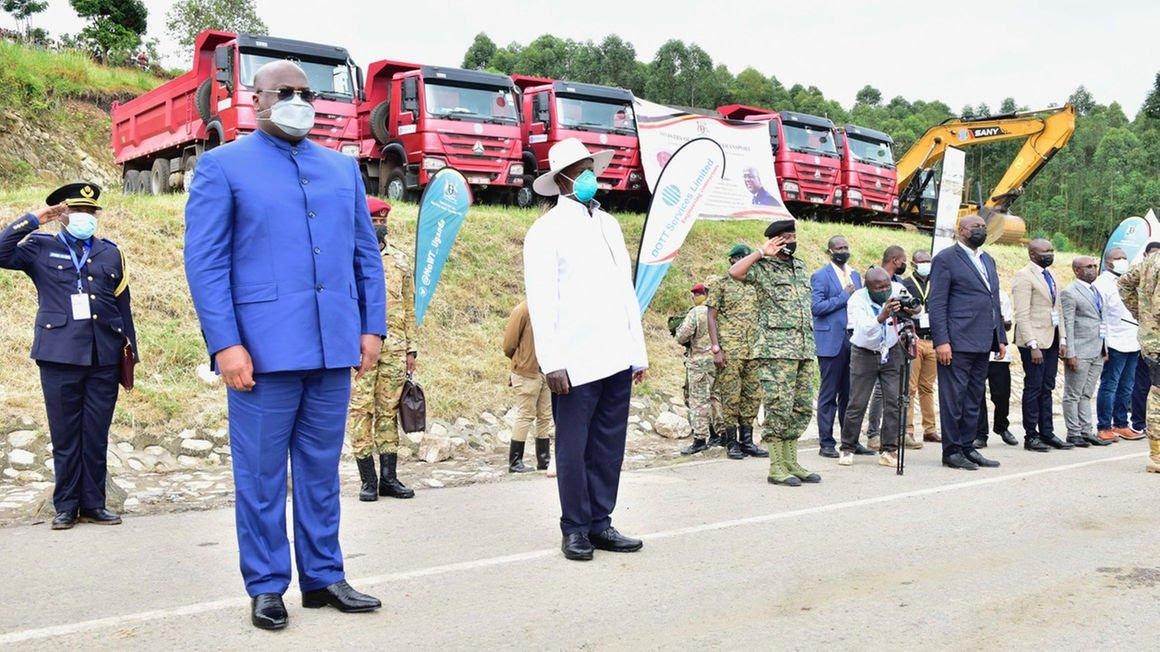Advertisement
As Uganda heads toward another election, debates are heating up about whether opposition leader Bobi Wine is an authentic voice of the people or a political pawn being used by the West—particularly the United States and its allies—to advance their strategic interests in East Africa.
Why the West Cares About Uganda
Uganda’s location is highly strategic. It borders the Democratic Republic of Congo (DRC), which possesses some of the world’s rarest minerals, vast gold reserves, and critical resources for global technology industries. Uganda has already expanded its presence in Congo, including building roads and facilitating mining projects. For Western powers, maintaining influence in Kampala means having a foothold next to one of Africa’s richest resource zones.
 |
| Uganda and DRC Begin Work on “Tremendous” Road-building Schemes |
At the same time, while countries in West Africa—such as Mali—have recently pushed out French and other Western influence, East Africa remains contested ground. As Uganda grows closer to China and Russia, Western governments fear losing another ally in the region.
Bobi Wine and the “Puppet” Narrative
Critics argue that Bobi Wine is being used by the West to replace President Yoweri Museveni, whose nearly four decades in power are increasingly tied to China and Russia. For example, China has heavily invested in Uganda’s infrastructure, including the Entebbe-Kampala Expressway and the Karuma Hydropower Project, while Russia has deepened military cooperation with Museveni.
Western governments, particularly the US and Canada, have openly criticized Museveni’s human rights record and lent moral support to Bobi Wine’s campaign. This has fueled suspicions that Wine’s rise is part of a larger geopolitical struggle—rather than simply a domestic democratic movement because think about this, Children and Babies have been killed in Gaza and continue to die by the hands of Israel but non of these countries has came out to talk about human right violations in Palestine ohhhhh wait , i mean what is left of it Gaza
Kizza Besigye and the Treason Allegations
Bobi Wine is not the first Ugandan opposition figure accused of Western backing. Kizza Besigye, a former ally turned rival of Museveni, has repeatedly been arrested. In 2024, he was forcibly returned from Kenya and charged in a Ugandan military court with treason. The charges were tied to an unverified audio clip allegedly featuring Besigye discussing acquiring guns and drones with English-speaking contacts, citing Ukraine’s use of drones in warfare.
No credible evidence has confirmed this clip, but it served Museveni’s strategy of portraying opposition leaders as foreign puppets engaged in regime-change plots. The Commonwealth criticized Besigye’s detention, but Western governments did little beyond statements of concern.
Museveni’s Turn to China and Russia
One reason the West may be more vocal now is Museveni’s growing alignment with Beijing and Moscow:
- China: Massive infrastructure funding and investments with few human rights conditions.
- Russia: Arms sales, military training, and strategic cooperation against Western pressure.
Uganda has even signaled it could deepen ties with Russia if Western countries continue supporting opposition movements. This puts Bobi Wine and Besigye at the center of a bigger geopolitical rivalry.
Selective Western Outrage?
Critics of the West point out a clear double standard: Museveni was tolerated for decades as a “reliable partner” despite authoritarianism, yet stronger criticism only surfaced when he drew closer to China and Russia. This suggests Western interest in Uganda may be less about democracy and more about maintaining regional influence.
Rare Footage: President Museveni Responds to Claims of Involvement in Muammar Gaddafi’s Assassination
In a continuation of the narrative that paints opposition figures like Bobi Wine as Western-backed tools designed to weaken Uganda and Africa at large, fresh focus has turned to long-standing allegations tying President Museveni to the assassination of Libya’s Muammar Gaddafi. These claims, largely fueled by certain Western media outlets, have for years attempted to tarnish Museveni’s reputation and distort Uganda’s role in Africa’s political landscape.
In a recently resurfaced video, President Museveni unequivocally denies any involvement in Gaddafi’s killing, dismissing the allegations as baseless propaganda. He argues that such narratives are carefully crafted to undermine African leaders who refuse to bow to foreign interests. According to him, the ultimate aim is to destabilize African unity and pave the way for external interference in the continent’s affairs.
The video not only seeks to clear his name but also to highlight the broader importance of solidarity among African nations. As Museveni points out, unity is essential if Africa is to resist manipulation, protect its sovereignty, and pursue a collective path toward development and self-reliance. The effort to link him to Gaddafi’s assassination is thus portrayed as part of a much larger scheme aimed at sowing division and mistrust across the continent.
For decades, the narrative of African strongmen being either pawns or villains has been heavily promoted by foreign media houses. However, Museveni’s remarks remind audiences that Africa’s story cannot continue to be written by outsiders. Instead, the continent must reclaim control of its history and future, countering disinformation with truth and collective resilience.
This footage represents more than just a denial—it is a call to Africans to question the sources of the information they consume and to recognize the geopolitical games often at play. Whether one agrees with Museveni or not, his message underscores a critical issue: the struggle for Africa’s independence is not yet over, and narratives are as powerful as weapons.
Conclusion
Is Bobi Wine a puppet of the West? The evidence remains mixed. While Western governments clearly support him rhetorically and diplomatically, there is little proof of direct material backing or military plotting. However, his popularity gives the West an opportunity to pressure Museveni and counter Chinese and Russian influence in East Africa.
Ultimately, the framing of Bobi Wine as a foreign puppet may serve Museveni’s interests as much as Western involvement serves theirs—leaving Ugandan voters caught in the middle of a larger geopolitical game.








